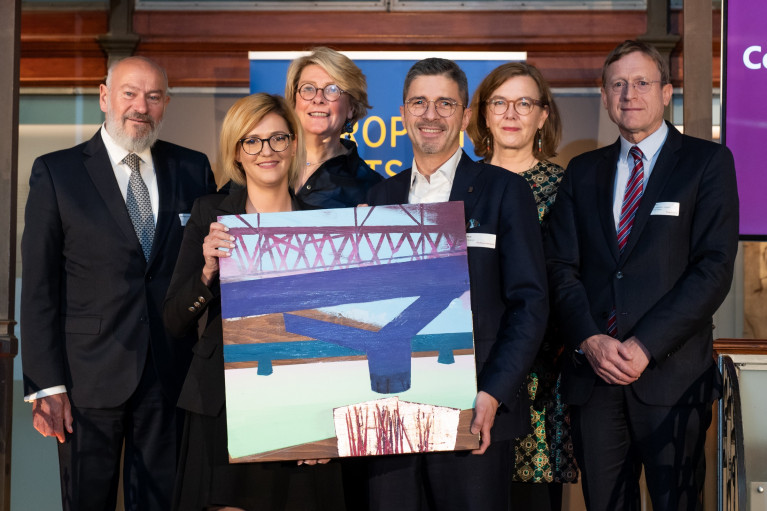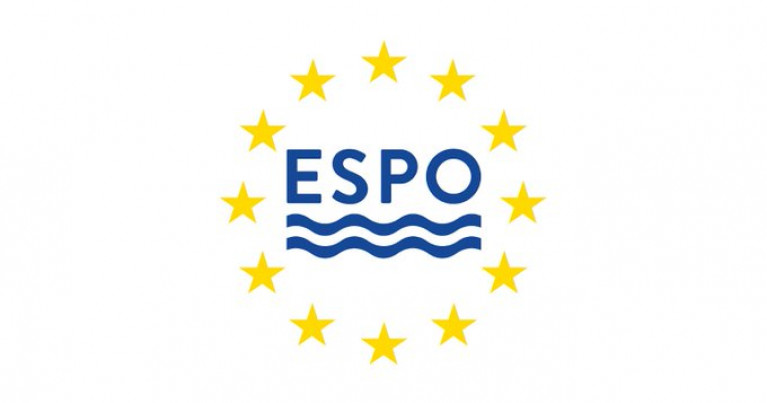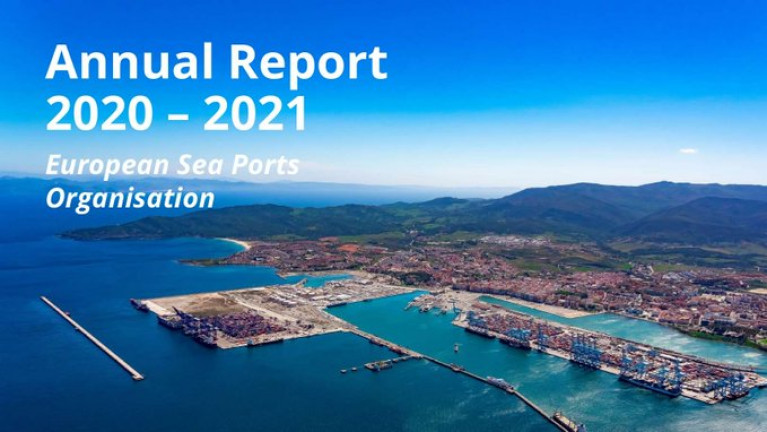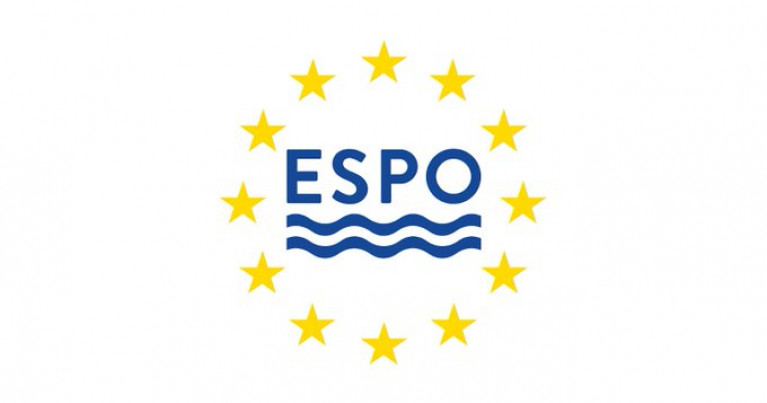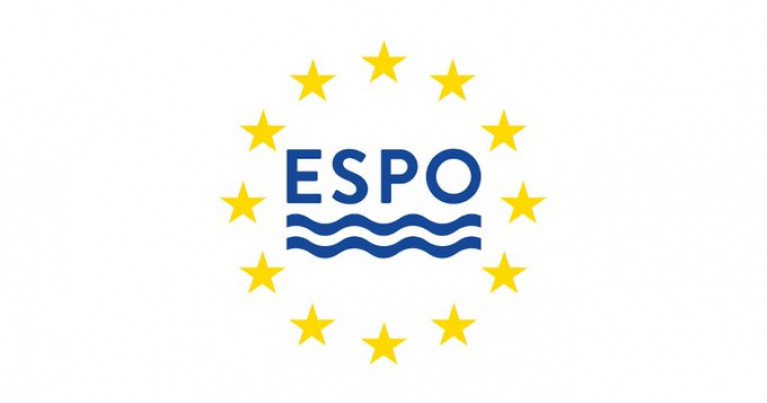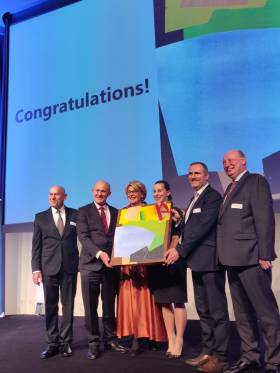Displaying items by tag: ESPO Award
Are You the 'Passenger' Port taking the ESPO Award 2022 Home? Submit Your Project Before 8 July
This year's European Sea Ports Organisation (ESPO) Award on Social Integration of Ports focuses on the “Role of maritime passenger transport in enhancing the city connectivity and bringing added value to the local community”.
Are you an ESPO (observer) member port and is your port involved in passenger transport? Then you might be the 2022 ESPO Award winner! If so, check out the terms of reference, select your project and submit it to the ESPO Secretariat by Friday, 8 July 2022 at the latest.
The application form and the terms of reference are available on the ESPO's website. Nothing ventured, nothing gained.
Ports in Europe welcome each year hundreds of millions of passengers, either as travellers, tourists or commuters. In many places, the maritime link ensures the main connection of the city with cities in other countries or with the mainland. Europe’s ports hence play an important role in making it possible for people to visit many beautiful port cities in Europe and discover their cultural and historical heritage. At the same time ferries connect ports in different or the same countries or even parts of a city, and enhance the sustainable connectivity of these cities.
The ESPO Award 2022 will go to the port managing body which has developed a series of initiatives and/or a strategy in collaboration with the different stakeholders and the city to enhance the maritime passenger links and the connectivity within the city or with other cities and regions of Europe, be it for its own citizens or for allowing visitors from all over the world to visit and discover the city and bring added value to the local community. The role of the port in enhancing the connectivity through a smooth and friendly passage through the port in and out of the city, as well as efforts of the port to give visitors a first good impression of the city or region are important criteria. Environmental and social sustainability of the project or strategy will be a prerequisite for winning the ESPO Award 2022.
The 14th ESPO Award will be officially handed out during an Award Ceremony and Dinner, which will take place in November 2022 in Brussels. All applications are promoted through a dedicated award brochure that is published and largely circulated.
About the ESPO Award
The ESPO Award was established in 2009 to promote innovative projects of port authorities that improve social integration of ports, especially with the city or wider community in which they are located. In this way, the Award aims to stimulate the sustainable development of European ports and their cities.
Previous winners of the Award are the Port of Gijón (2009), the Port of Helsinki (2010), the Ports of Stockholm (2011), the Port of Genoa (2012), the Port of Antwerp (2013), the Port of Koper (2014), Port of Dublin (2015), BremenPorts (2016), Guadeloupe Ports Caraïbes (2017), Port of Rotterdam (2018), Port of Dover (2019), Algeciras Port Authority (2020), and Port of Gdańsk Authority (2021).
European Sea Ports Organisation Opens Submissions for Award 2022
The European Sea Ports Organisation (ESPO) Award on Social Integration of Ports is entering its 14th edition, with the theme “Role of maritime passenger transport in enhancing the city connectivity and bringing added value to the local community”.
Ports in Europe welcome each year hundreds of millions of passengers, either as travellers, tourists or commuters. In many places, the maritime link ensures the main connection of the city with cities in other countries or with the mainland. Europe’s ports hence play an important role in making it possible for people to visit many beautiful port cities in Europe and discover their cultural and historical heritage. At the same time ferries connect ports in different or the same countries or even parts of a city, and enhance the sustainable connectivity of these cities.
The ESPO Award 2022 will go to the port managing body which has developed a series of initiatives and/or a strategy in collaboration with the different stakeholders and the city to enhance the maritime passenger links and the connectivity within the city or with other cities and regions of Europe, be it for its own citizens or for allowing visitors from all over the world to visit and discover the city and bring added value to the local community.
The role of the port in enhancing the connectivity through a smooth ship shore connection, as well as efforts of the port to give visitors a first good impression of the city or region are important criteria. Environmental and social sustainability of the project or strategy will be a prerequisite for winning the ESPO Award 2022.
Project submissions have to reach the ESPO Secretariat by Friday 8 July 2022 at the latest. The application form and the terms of reference are available on the ESPO Website.
The 14th ESPO Award will be officially handed out during an Award Ceremony and Dinner, which will take place in November 2022 in Brussels.
About the ESPO award
The ESPO Award was established in 2009 to promote innovative projects of port authorities that improve social integration of ports, especially with the city or wider community in which they are located. In this way, the Award aims to stimulate the sustainable development of European ports and their cities.
Previous winners of the Award are the Port of Gijón (2009), the Port of Helsinki (2010), the Ports of Stockholm (2011), the Port of Genoa (2012), the Port of Antwerp (2013), the Port of Koper (2014), Port of Dublin (2015), BremenPorts (2016), Guadeloupe Ports Caraïbes (2017), Port of Rotterdam (2018), Port of Dover (2019), Algeciras Port Authority (2020), and Port of Gdańsk Authority (2021).
This week the Port of Gdańsk Authority in Poland, was announced winner of the European Sea Ports Organsisation (ESPO) Award 2021 in recognition of its role in the recovery of the city and the local community during lock-downs.
The ESPO Award was handed out by Walter Goetz, Head of Cabinet of Adina Vălean, the Commissioner for Transport, during the traditional ceremony and dinner at the Museum of Natural Sciences in Brussels, which gathered more than 170 guests.
Port of Gdańsk Authority won the ESPO Award 2021 for its project “WE ARE – unification of local community of Gdańsk’s districts Nowy Port and Stogi with its old neighbour, the sea port”.
Various activities took place under the WE ARE slogan to promote the values of cooperation, solidarity and responsibility. Efforts focussed on the residents of two districts of Gdańsk: Nowy Port and Stogi.
During the longest lockdown, the Port funded and distributed 8000 meals to seniors who were most exposed to the risk of contracting COVID-19, purchased medical equipment for Pomeranian hospitals to combat the coronavirus, supported local sports clubs to continue training, and supported two local initiatives.
Looking back at the selection process in this 13th edition of the ESPO Award, the Chairman of the Jury, Dimitrios Theologitis said: "The jury was convinced by the "We Are" initiative of the port of Gdánsk. In difficult times, the port showed cooperation, responsibility and solidarity. Its actions were highly appreciated by the local community and strengthened the ties between the city and what is otherwise a remote industrial environment. Many of the effects will continue to be felt in the future. The award is a symbol that the work done by the ports is also inspired and directed towards people.”
Łukasz Greinke, CEO of Port of Gdańsk Authority says : “This award makes us even more convinced that good comes back as soon as we open ourselves to other people. Since the beginning of the pandemic, we have supported those on the front lines of the fight against the coronavirus: paramedics in the entire Pomorze region, also the seniors, and sport initiatives focused on children. The time of the pandemic released in us a huge amount of energy and empathy and a sense of solidarity, so needed at this time. Congratulations to all finalists. We are impressed with your initiatives. The award is our motivation for further actions in the future.”
Out of the eleven submissions received this year, the projects of Gdańsk Authority S.A. (Poland), Hamburg Port Authority (Germany), Port Authority of Valencia (Spain) and Port Authority of Vigo (Spain) had been shortlisted for this 13th edition. All the submissions are summarised in the ESPO Award Brochure 2021.
On the same day of the award announcement, 9 November, ESPO has also published its Annual Report 2020-2021, which outlines the activities of the organisation over the past year.
Irish Port Among Ports in the Running for ESPO's Social Integration of Ports Award 2021
This year's European Sea Port Organisation (EPSO)'s Award on Social Integration, sees 11 ports (among them an Irish Port) that have submitted a project for the award.
The following is a list in alphabetical order by country of the ports all in the running for the EPSO Award 2021:
Guadeloupe Port Caraïbes (France), Hamburg Port Authority (Germany), Piraeus Port Authority (Greece), Dublin Port Company (Ireland), Port Network Authority of the Northern Central Tyrrhenian Sea (Italy), Port Network Authority of the Ionian Sea – Port of Taranto (Italy), Port of Gdansk (Poland), Port Authority of Ceuta (Spain), Port Authority of Valencia (Spain), Port Authority of Vigo (Spain), and Ports of Stockholm (Sweden) (in alphabetical order by country), are all in the running for this year’s Award.
The theme of this 13th edition of the ESPO Award is “Role of ports in the recovery of the city and the local community”.
The ESPO Award 2021 will go to the port managing body that succeeds best in playing a role in the recovery from the current crisis and in contributing to enhancing the prosperity of the city, local community and region. The winning port will demonstrate to what extent its focus and activities are essential for the recovery of the surrounding city and local community and which successful steps it is taking to assist in the social, cultural and economic recovery and prosperity of the city, local community and region.
As Afloat highlighted, ESPO members had an opportinuity to submit their applications until 1 July.
The ESPO Award winning port will be selected by an independent jury of international experts, under the Chairmanship of Dimitrios Theologitis, former Head of Unit of Ports and Inland Navigation in DG MOVE at the European Commission. The winner will be announced at the ESPO Award Ceremony and Dinner taking place on 9 November in Brussels.
About the ESPO Award
The ESPO Award was established in 2009 to promote innovative projects of port authorities that improve social integration of ports, especially with the city or wider community in which they are located. In this way, the Award aims to stimulate the sustainable development of European ports and their cities.
Previous winners of the Award are the Port of Gijón (2009), the Port of Helsinki (2010), the Ports of Stockholm (2011), the Port of Genoa (2012), the Port of Antwerp (2013), the Port of Koper (2014), Port of Dublin (2015), BremenPorts (2016), Guadeloupe Ports Caraïbes (2017), Port of Rotterdam (2018), Port of Dover (2019), and Algeciras Port Authority (2020).
The European Sea Ports Organisation (ESPO) Award 2021 will reward the port’s role in contributing to the recovery and prosperity of the local community.
The ESPO Award on Social Integration of Ports is entering its 13th edition, with the theme “Role of ports in the recovery of the city and the local community”. Project submissions have to reach the ESPO Secretariat by Thursday 1 July 2021 at the latest. The application form and the terms of reference are available on the ESPO website.
The ESPO Award 2021 will go to the port managing body that succeeds best in playing a role in the recovery from the current crisis and in contributing to enhancing the prosperity of the city, local community and region. The winning port will demonstrate to what extent its focus and activities are essential for the recovery of the surrounding city and local community and which successful steps it is taking to assist in the social, cultural and economic recovery and prosperity of the city, local community and region.
“Europe’s ports have been playing a critical and essential role for society and the economy during the COVID-19 pandemic by remaining open and operational throughout the whole crisis. They have made tremendous efforts to ensure that goods continue to reach consumers and industries. Today, more than ever in their recent history, they live up to their function as ‘engines for growth’, taking central stage in the recovery of Europe and in bringing back prosperity to their local community, their city and their wider hinterland,” says Dimitrios Theologitis, former Head of the port policy unit in DG MOVE at the European Commission. Mr Theologitis is the new Chair of the ESPO Award jury.
The 13th ESPO Award will be officially handed out during an Award Ceremony and Dinner, which will take place in November 2021 in Brussels (exact date to be confirmed).
ESPO Award 2020: Algeciras Port Authority wins the ESPO Award – The 2020 Award Ceremony was held in a digital way given the health restrictions related to COVID-19.
About the ESPO Award
The ESPO Award was established in 2009 to promote innovative projects of port authorities that improve social integration of ports, especially with the city or wider community in which they are located. In this way, the Award aims to stimulate the sustainable development of European ports and their cities.
Previous winners of the Award are the Port of Gijón (2009), the Port of Helsinki (2010), the Ports of Stockholm (2011), the Port of Genoa (2012), the Port of Antwerp (2013), the Port of Koper (2014), Port of Dublin (2015), BremenPorts (2016), Guadeloupe Ports Caraïbes (2017), Port of Rotterdam (2018), Port of Dover (2019), and Algeciras Port Authority (2020).
European Sea Ports Organisation (ESPO) Award Winner is the Port of Dover
This year's European Sea Ports Organisation (ESPO) Award winner is the Port of Dover in recognition of its successful strategy to reach out to the local community and to directly communicate with the port citizens.
Using social media as a new way of communicating and demonstrating a high level of transparency about operational achievements, future strategies and environmental challenges and performance is becoming increasingly important for European ports who can only function and further develop if they receive the licence to operate from the local citizens.
The ESPO Award was handed out on Wednesday by the Director-General of DG Move Henrik Hololei during a ceremony at the “Albert Hall” in Brussels.
Looking back at the selection process in this 11th edition of the ESPO Award, the Chairman of the Jury, Dimitrios Theologitis said: “The Jury was impressed by Port of Dover’s strategy which is centred around campaigns on all media, electronic and others, leaflets, consultations, forums, workshops, sports events. But the most important ingredient of this successful strategy is giving back to the community, be it financial participation in charities and community groups, making the installations available to the public for events, or foreseeing spaces and buildings open to the public”.
The Port of Dover won the 2019 Award for its project, “Transparen-SEA (Socially Engaged Accountability)”, which aims to create a comprehensive and meaningful programme of consultative and social community engagement events alongside the cultivation of an internal network of port ambassadors whose advocacy ultimately permeates back into the local community where many live. This was all supported with a social media overlay that connects directly with the community and reinforces the aims of the project.
The project has not just been focused on one particular aspect of engagement, it has been a wholesale immersion in the community and the community in the port. What is equally important is that the social media has not just been a faceless arm’s length engagement tool, but has been used to create the end result of much more face to face engagement so that the people of the port community and the people of the local community recognise each other, and do so as part of the same overall community, importantly all buying in to the same shared vision and giving everyone a sense of ownership of that process.
Richard Christian, Head of Policy and Communications, Port of Dover said "Having gone through such a rigorous selection process alongside many other great ports, to have been chosen as the winner is a fantastic achievement for the whole team at Dover. Our comprehensive and continuing programme of societal engagement is something of which we can be proud in setting the standard across Europe. Our thanks to ESPO and the judges for this great honour."
The ESPO Award 2019 saw four projects from Port of Dover, Dublin Port Company, Ports of Stockholm and Union des Ports de France (UPF) compete for the prize.

